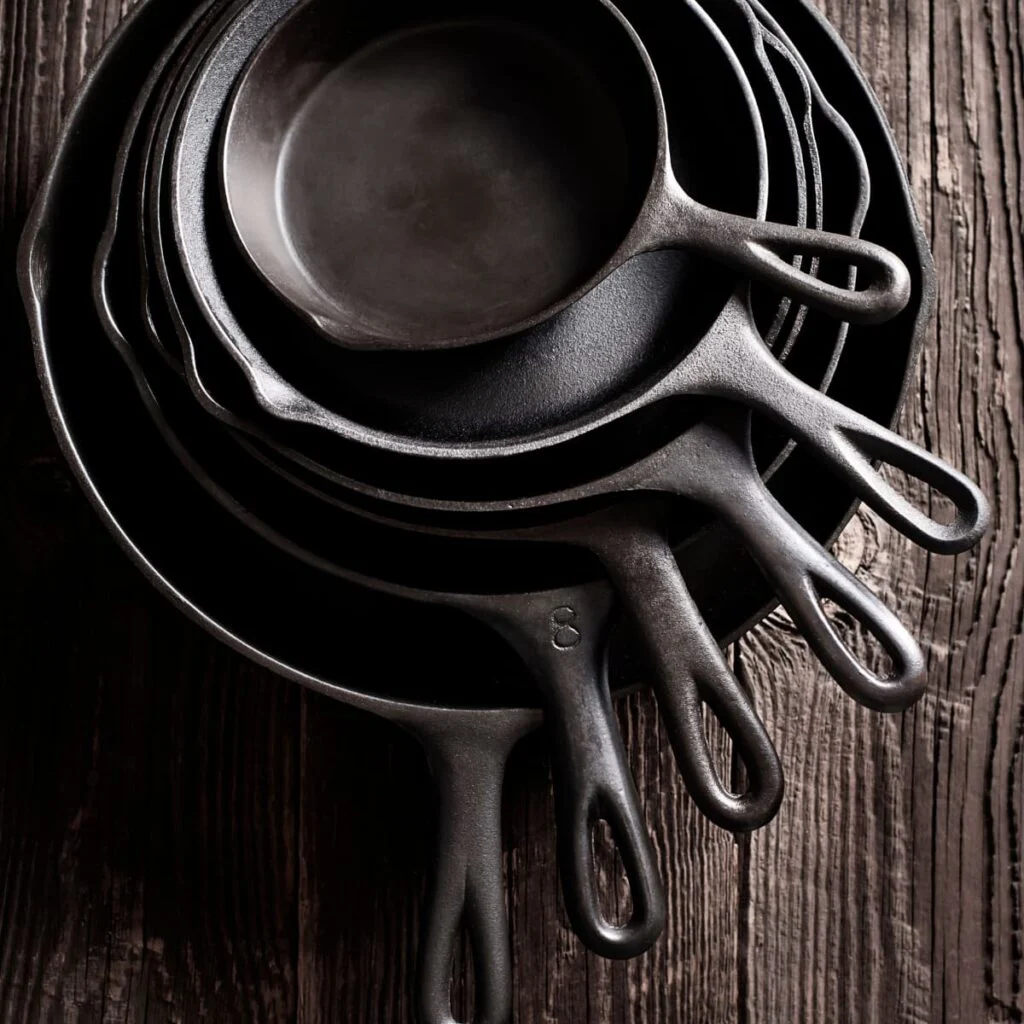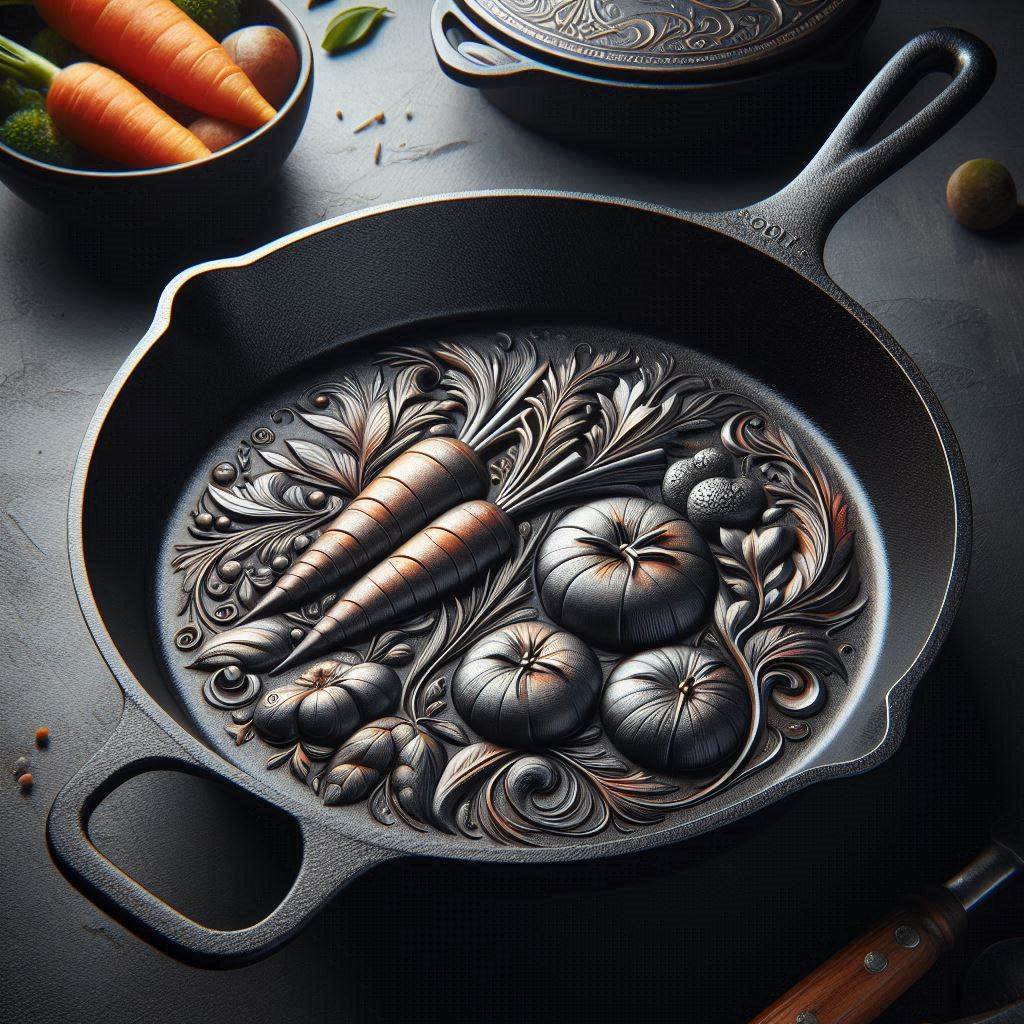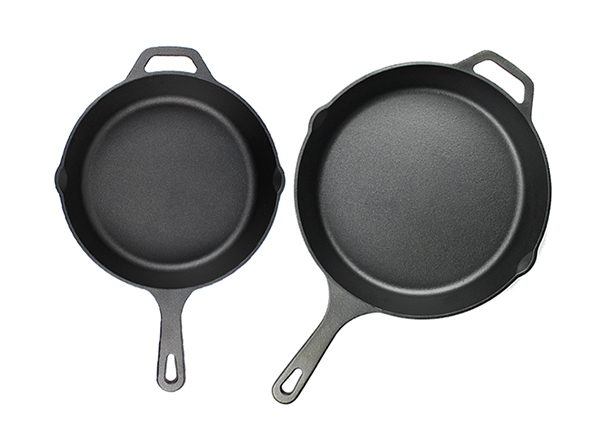Introduction
Hard nitriding cast iron is a surface treatment process that improves cast iron’s durability and wear resistance. It diffuses nitrogen into the material’s surface, creating a hard nitride layer. This process enhances cast iron’s properties, making it ideal for various applications, including cookware.
Benefits Of Hard Nitriding For Enhancing Durability

Hard nitriding offers several benefits for enhancing the durability of cast iron in cookware:
- Increased Hardness: Hard nitriding significantly increases the surface hardness of cast iron, making it more resistant to scratches, abrasion, and wear over time.
- Improved Corrosion Resistance: The formation of a hard nitride layer provides enhanced corrosion resistance to the cookware, preventing rust and extending its lifespan.
- Better Heat Distribution: Nitrided cast iron has excellent heat retention and distribution properties, resulting in more even cooking and reducing hotspots.
- Easy Cleaning and Maintenance: Hard nitrided cast iron’s enhanced durability makes it easier to clean and maintain, as it is less prone to staining or sticking.
- Longer Lifespan: Cookware treated with hard nitriding has a longer lifespan than traditional cast iron, offering better value for money.
Overall, hard nitriding is an effective surface treatment for increasing the durability and performance of cast iron cookware. Its benefits make it a preferred choice among chefs and home cooks alike.
Understanding Cast Iron Cookware
Cast iron cookware is known for its exceptional heat retention and even heat distribution. It is highly durable and can withstand high cooking temperatures.
When properly seasoned, cast iron cookware has a natural non-stick surface, making it ideal for frying and searing. Cast iron cookware is versatile and can be used on various heat sources, including stovetop, oven, and grill. It is also known for its rustic charm and can be easily transferred from the kitchen to the dining table.
Common Issues With Traditional Cast Iron Cookware
Although traditional cast iron cookware has numerous benefits, it has drawbacks. Some common issues include:
- Rust and Corrosion: Traditional cast iron requires regular seasoning and proper maintenance to prevent rust and corrosion.
- Sticking and Cleaning Difficulties: Food may stick to the surface of traditional cast iron, making it difficult to clean.
- Weight: Cast iron cookware can be heavy and requires effort to lift and handle.
- Reactivity: Cast iron can react with certain acidic foods, altering the taste and color.
- Fragility: Dropping or mishandling traditional cast iron cookware can cause it to crack or chip.
Overall, while traditional cast iron cookware has its drawbacks, the benefits of its durability and heat retention make it a popular choice among chefs and home cooks. However, advancements in surface treatment processes like hard nitriding have addressed some of these issues, providing an even more reliable and long-lasting option for cookware.
Exploring Hard Nitriding

Process Of Hard Nitriding
Hard nitriding is a surface treatment process that improves the properties of cast iron cookware. The process involves diffusing nitrogen into the surface of the cast iron at high temperatures, usually around 500 to 590 degrees Celsius (932 to 1094 degrees Fahrenheit). This creates a hardened layer on the cookware’s surface, increasing its resistance to wear, corrosion, and scratching.
How Hard Nitriding Improves The Surface Hardness Of Cast Iron?
Hard nitriding significantly increases the surface hardness of cast iron cookware. Nitrogen atoms infiltrate the cookware’s surface and combine with the iron atoms to form a nitride layer. This layer is much harder than the original cast iron, improving resistance against scratching and wear.
Compared to traditional cast iron cookware, hard-nitrided cast iron has several advantages:
- Enhanced corrosion resistance: The nitride layer is a barrier against moisture and corrosive agents, minimizing the risk of rust and corrosion.
- Improved release properties: The hard nitride layer creates a smoother surface, reducing sticking and making it easier to release cooked food.
- Increased durability: The hardened surface is more resilient, reducing the likelihood of cracking or chipping from accidental drops or mishandling.
- Retained heat retention: Hard-nitrided cast iron retains heat exceptionally well, allowing for even cooking and keeping food warm for longer.
The hard nitriding process greatly enhances cast iron cookware’s surface hardness and performance. With improved corrosion resistance, enhanced release properties, increased durability, and retained heat retention, hard-nitrided cast iron cookware offers a reliable and long-lasting option for professional chefs and home cooks.
Hard Nitriding Vs. Traditional Seasoning
Differences Between Hard Nitriding And Traditional Seasoning Methods
- Hard nitriding is a surface treatment process that increases the surface hardness of cast iron cookware, while traditional seasoning involves building up a layer of polymerized oil on the surface.
- Hard nitriding creates a nitride layer that is much harder than the original cast iron, providing enhanced durability and resistance to wear. Traditional seasoning, on the other hand, relies on the buildup of oil layers to improve the cookware’s non-stick properties. Builduptriding is a permanent treatment that does not require regular re-seasoning like traditional seasoning. Once the cookware is hard-nitrided, it retains its properties for a long time without additional maintenance.
Care And Maintenance Of Hard Nitrided Cast Iron Cookware
Proper Cleaning And Storage Techniques
Proper cleaning and storage techniques are essential for maintaining the performance and longevity of hard-nitrided cast iron cookware. Here are some tips to follow:
- Cleaning:
- After each use, allow the cookware to cool down before cleaning.
- Wash the cookware with warm water and mild dish soap using a sponge or a soft brush. Avoid using abrasive cleaners or scouring pads that can damage the nitride layer.
- For stubborn stains, soak the cookware for a short period before washing.
- After cleaning, thoroughly dry the cookware to prevent rust.
- Storage:
- Store the cookware in a clean, dry place to prevent moisture buildup and rusting.
- Stack the cookware buildup paper towel or cloth between each piece to avoid scratching the nitride layer.
- If stacking is impossible, use pot protectors to prevent direct contact between the pieces.
Tips For Maintaining The Hardness And Longevity Of Hard Nitrided Cookware

To ensure the hardness and longevity of hard-nitrided cookware, consider the following tips:
- Avoid thermal shocks: Avoid exposing the cookware to extreme temperature changes, such as placing a hot pan directly into cold water. Thermal shocks can cause the nitride layer to crack or peel.
- Use appropriate utensils: To prevent scratching the nitride layer, use wood, silicone, or other non-metal materials. Avoid using metal utensils that can chip or damage the surface.
- Refrain from excessive scraping: Avoid scraping the cookware with sharp objects or abrasive materials, as they can scratch or remove the nitride layer.
- Re-season if necessary: If the cookware’s non-stick properties diminish over time, you can re-season the surface by applying a thin layer of oil and baking it in the oven. Follow the manufacturer’s instructions for re-seasoning.
Cooking With Hard Nitrided Cast Iron
Best Practices For Cooking With Hard Nitrided Cast Iron Cookware
When using hard-nitrided cast iron cookware, there are a few best practices to keep in mind:
- Preheat your cookware before adding any ingredients to ensure even heat distribution.
- Use a moderate heat setting to prevent food from sticking to the surface.
- Avoid using metal utensils that can scratch the non-stick surface; opt for wooden or silicone utensils instead.
- Regularly season your cookware to maintain its non-stick properties. Follow the manufacturer’s instructions for seasoning.
- Allow your cookware to cool down completely before cleaning it. Avoid using abrasive cleaners that can damage the surface.
Experiences And Reviews From Users
Users who have tried hard-nitrided cast iron cookware are generally satisfied with its performance and durability. Many praise its excellent heat distribution and retention properties, which allow for even cooking and consistent results.
Additionally, users appreciate the cookware’s non-stick surface, which makes cooking and cleaning a breeze. Hard-nitrided cast iron cookware is also noted for its versatility, as it can be used on various stovetop types, including induction.
Overall, users have found these cookware brands reliable and worth the investment, providing them with high-quality cookware that meets their cooking needs.
Conclusion
Summary Of The Benefits Of Hard Nitrided Cast Iron Cookware
Following a few best practices for optimal performance is important when using hard-nitrided cast iron cookware. Preheating the cookware ensures even heat distribution, while moderate heat prevents food from sticking to the surface. Using wooden or silicone utensils prevents scratching the non-stick surface, and regular seasoning helps maintain its non-stick properties. Allowing the cookware to cool completely before cleaning and avoiding abrasive cleaners ensures longevity.
Thanks to its excellent heat distribution and retention properties, users have generally been satisfied with hard-nitrided cast iron cookware. The non-stick surface makes cooking and cleaning easy, and its versatility allows use on various stovetop types.
Future Trends And Advancements In Cast Iron Cookware Technology
The field of cast iron cookware is constantly evolving, with manufacturers always exploring new possibilities and improvements. Some potential future trends and advancements in cast iron cookware technology include:
- Enhanced non-stick properties: Manufacturers may continue to improve the non-stick properties of cast iron cookware, making it even easier to cook without excess oil or butter.
- Lighter and thinner designs: As technology advances, cast iron cookware may become lighter and thinner while maintaining its heat retention capabilities.
- Specialized coatings: There may be developments in specialized coatings that offer additional benefits, such as enhanced durability or improved heat distribution.
- Smart features: With the rise of smart home technology, cast iron cookware may incorporate smart features that allow for precise temperature control or monitoring.
These potential advancements could further enhance the cooking experience with cast iron cookware, providing users with more convenience and better results.
References:
FAQ about Hard Nitriding Cast Iron: Enhancing the Durability of Cast Iron Cookware
Q: What is hard nitriding cast iron?
A: Hard nitriding cast iron is a surface treatment method used to enhance the durability of cast iron cookware. It involves a chemical process that modifies the surface of the cast iron, forming a hard and wear-resistant layer.
Q: How does hard nitriding improve the durability of cast iron cookware?
A: Hard nitriding creates a surface layer that is harder and more wear-resistant than untreated cast iron. This layer helps to prevent scratching, chipping, and rusting, thereby increasing the overall durability of the cookware.
Q: What are the benefits of using hard nitriding cast iron cookware?
A: Hard nitriding cast iron cookware offers several advantages. It enhances the longevity of the cookware, providing more convenience and better results for users.
Q: How does hard nitriding cast iron enhance the cooking experience?
A: Hard nitriding increases the cookware’s durability, ensuring that the cast iron retains its quality over time, allowing consistent and efficient cooking results. The enhanced surface also helps to prevent scratches and rust, maintaining the cookware’s aesthetics.
Q: Is hard-nitriding cast iron cookware safe for cooking?
A: Yes, hard-nitriding cast iron cookware is safe for cooking. The surface treatment does not introduce harmful chemicals and helps improve the cookware’s overall performance and longevity.

The Stone’s Sports Grill and Bar was Established on December 1, 2021. The Stone is a Sequel to another restaurant called Cornerstone’s First Edition in Tucumcari, NM. This particular venue is located on the Southeast side of Colorado Springs. The Stone is Wide Open. We have a large dance floor, multi-level stage, pool room, (5) dart boards, and a bar with a large selection of wine spirits and brews.